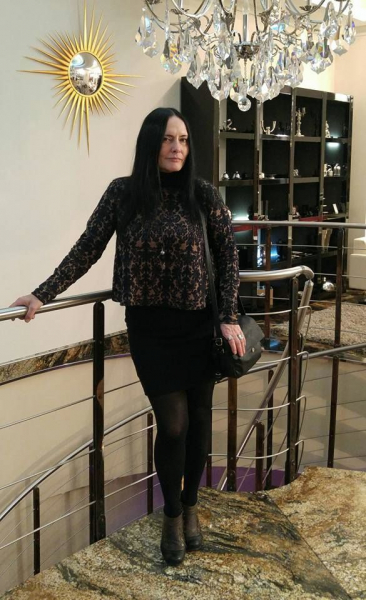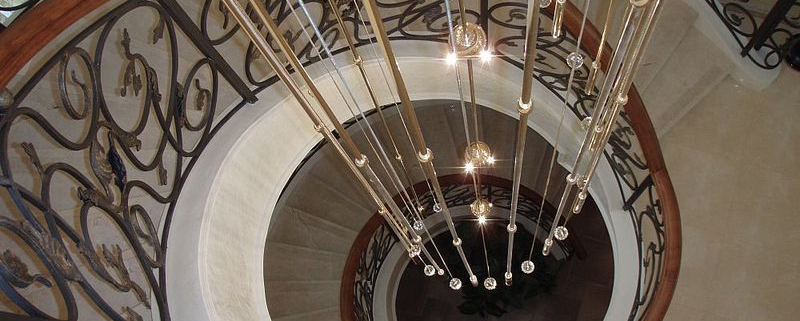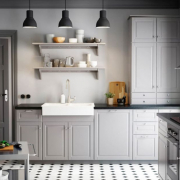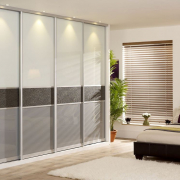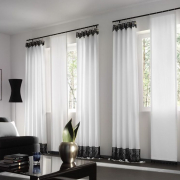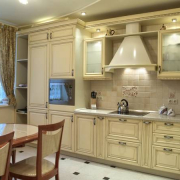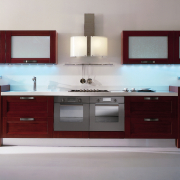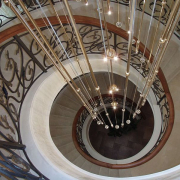Curtains – are a space for creativity
Strict velvet curtains, light curtains, flirty polka dots, bright chintz, luxurious satin, iridescent organza — what kind of curtains are not on sale today! But they must be selected carefully, because, according to designers, it is curtains and carpets that are the main accents of the interior. Try changing the curtains — and you will see how the room will change. In addition, with their help, you can hide some shortcomings, visually make the room larger or smaller, darker or lighter. No matter what you choose, the design of the curtains should match the style of the room. In addition, high-quality curtains, provided proper care, can serve for decades.
Classic curtains consist of curtains (made of dense fabric), tulle (curtains made of light transparent fabric) and lambrequin (a short curtain hiding the cornice). Designers advise choosing curtains of a darker or lighter shade than wallpaper or upholstery, so that they complement the interior, and not merge with it.
Do not forget also about the properties of colors. After all, there are warm colors — yellow, red, brown, they will help create an atmosphere of comfort; cool — blue, gray will give a feeling of freshness. Curtains with transverse stripes will visually expand the space, and with vertical ones — make it higher. For small rooms, it is better to choose simple models with medium-sized patterns or transparent ones. In poorly lit rooms, hang curtains made of light fabrics of light colors.
If there is wallpaper with a pattern in the room, then the curtains should be plain, and vice versa. Colorful bright fabrics oblige you to carefully select other interior items for them. For example, checkered curtains are not suitable for strict rooms. At the same time, they will look appropriate in the kitchen or in a rural-style room. In spacious rooms with large windows, you can let your imagination run wild and create folded or layered curtains made of different fabrics. Depending on the height of the ceiling, the length of the curtains can be both to the floor and to the window sill.
Lambrequin is considered an additional element. It decorates the upper part of the window, gives a sense of completeness and creates comfort in the room, especially if sliding glazing is used, but it is not suitable for rooms with low ceilings. Some make a “perekid” — a cloth of fabric wrapping around the cornice and hanging arbitrarily. You can leave the lambrequin flat or cut in the shape of an arch.
It should also be decided whether the curtains will perform only a decorative function, or also a practical one, that is, protect the room from the sun and prying eyes. In addition, curtains made of dense fabrics or lined will also help protect the room from cold and drafts.
If until recently curtains (tulle) were produced simply in the form of a transparent light white fabric, now they come in a variety of colors, with drawings, embroidery, applications. But when buying such, one should not forget that they should be in harmony with the color of the curtains. For example, if both tulle and curtains are multicolored, the window will look too colorful. A special chic is double curtains, when two layers of fabric are connected in different places or the first layer is transparent or shorter than the other. The decor of curtains is also important, especially if they are plain. So, the bottom edge can be trimmed with fringe, decorated with brushes.
It is advisable to have at least two pairs of curtains — this will sometimes allow you to change the interior and prolong their life. For the warm season, choose lighter fabrics, cold — dense, in warm colors. As for the composition of fabrics for curtains and curtains, this is the case when it is better to give preference to synthetics, in particular polyester. Such curtains are easier to wash (but at a water temperature no higher than 30-40 degrees), they keep their shape better and last longer. At the same time, fabrics made of natural materials burn out and deform faster.
For the kitchen, light tulle, organza, roll-up or simple-cut curtains are more suitable. It is desirable that they are easy to wash. For the children’s room, choose curtains of bright colors with funny patterns — children love everything bright. And for the bedroom, it is better to choose curtains made of dense fabrics of warm colors, because this is a place to relax.
The cornice can be attached to the ceiling or the top of the wall above the window. It should be in harmony with the curtains and the interior and, of course, hold on securely. When choosing a curtain rod, check whether the hooks or rings for attaching curtains slide easily over it so that they can be conveniently pushed apart and closed. Wooden cornices are considered classics. They are easy to match the color of the furniture. Swap advantages are also available for metal ones. One of them is durability. The cheapest plastic cornices. The tips on the cornices in the form of various figures are also a popular element of the window decor.
Special attention should be paid to the fastenings for curtains. Gone are the days when housewives on their upper edge manually sewed loops of thread under metal hooks on the eaves. They spoiled the overall appearance of the curtains and quickly broke off. Now the stores sell curtain webbing, in which loops are provided. Grommets are also often used — metal-edged holes in the upper part of the curtains through which the cornice is threaded.
Curtains can also be hung with clips, attached to the cornice with bows made of the same fabric as the curtains, finally, just tuck the upper part and stitch, and insert a thin cornice inside.
